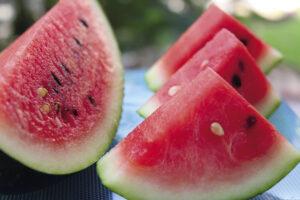Drought, technological competition and collaboration: the domestic melon season has begun
The 2025 Hungarian melon season starts amidst serious challenges: the lack of rainfall, the growing production areas and the increasingly fierce market competition determine this year’s prospects – this was announced at the press event of the National Chamber of Agriculture in Budapest. Although domestic cantaloupe and yellow melons remain popular summer fruits, the changed production environment requires increased adaptation from farmers.
 Imre Csizmadi, President of the NAK Horticulture and Supply Industry Department, said: in many parts of the country there has been no rain for five weeks, which has a significant impact on the quantity and quality of the crop. Although irrigation helps to mitigate the damage in many places, the smaller size of the fruits and a decrease in yield are still expected. Despite this, melon growers are making great efforts, which, according to the expert, should be recognized with fair purchase prices.
Imre Csizmadi, President of the NAK Horticulture and Supply Industry Department, said: in many parts of the country there has been no rain for five weeks, which has a significant impact on the quantity and quality of the crop. Although irrigation helps to mitigate the damage in many places, the smaller size of the fruits and a decrease in yield are still expected. Despite this, melon growers are making great efforts, which, according to the expert, should be recognized with fair purchase prices.
Thanks to recent technological developments, the watermelon growing area has expanded by 10 percent this year, to 3,700 hectares, while a 15 percent expansion was registered for cantaloupe, to nearly 500 hectares. However, the market is increasingly concentrated, so Imre Csizmadi emphasized: the domestic sector can only remain competitive in the long term by working together.
István Varga, Vice President of FruitVeB, also spoke at the press event, according to whom the domestic melon remains one of the most popular summer fruits, but the future belongs to efficient farmers who apply modern technology. Producers using extensive, outdated methods may gradually be forced out of the market. As a result of climate change, Hungarian production conditions are becoming increasingly Mediterranean in nature, which creates new challenges and a competitive situation.
Mátyás Göcző, president of the Hungarian Melon Producers Association, reported that Hungarian melons have been on the market for two weeks, but the real season is only just beginning. The domestic harvest will be available nationwide from July 13, and he asked store chains to give Hungarian melons priority over imports on the shelves.
The conclusion of the professional event is clear: the situation of Hungarian melon production is stable, but its future increasingly depends on whether it can adapt to water shortages, modernize technologies, provide fair prices to farmers, and maintain competitiveness through unified sectoral cooperation – both at home and in export markets.
Related news
NAK President: more than 120 thousand people signed the agricultural petition in one month
🎧 Hallgasd a cikket: Lejátszás Szünet Folytatás Leállítás Nyelv: Auto…
Read more >Related news
Pálinka, my love…
🎧 Hallgasd a cikket: Lejátszás Szünet Folytatás Leállítás Nyelv: Auto…
Read more >Not a turnaround, but consolidation: an agricultural outlook for 2026
🎧 Hallgasd a cikket: Lejátszás Szünet Folytatás Leállítás Nyelv: Auto…
Read more >Sephora is coming to Belgium this year
🎧 Hallgasd a cikket: Lejátszás Szünet Folytatás Leállítás Nyelv: Auto…
Read more >








